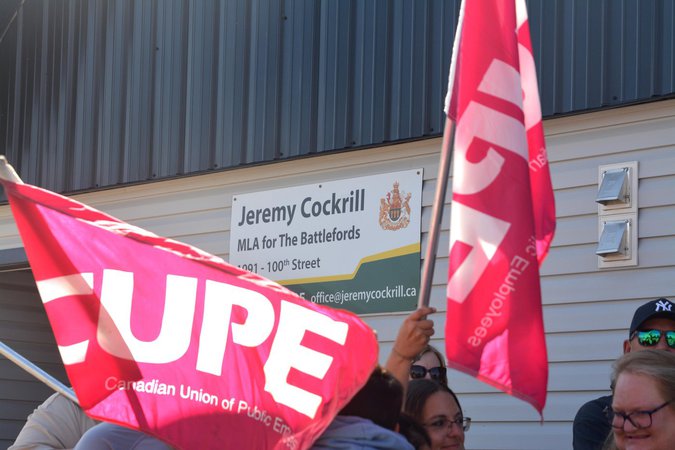
Union president Bashir Jalloh said members are burning out, wages lag behind other provinces, and staff are leaving Saskatchewan — leaving hospitals short and services disrupted.
“Since 2017, our wage has only gone up by five per cent and during that same time frame, we know the cost of living has gone up by 20 per cent. You do the math,” Jalloh said.
“We cannot continue with the current trajectory.”
Jalloh pointed to recent service interruptions at BUH, where he said a CT scanner often sits idle most of the day due to a lack of staff. He also noted emergency room closures and canceled surgeries across the province.
(Kenneth Cheung/battlefordsNOW staff)
According to new internal Saskatchewan Health Authority data obtained by the Saskatchewan NDP through a Freedom of Information request, Battlefords Union Hospital had 581 days of total service disruptions between February 2018 and May 2025.
Province-wide, there were 3,362 days of lost health care service between November 2023 and May 2025.
Brittany Rae, a fifth-generation health worker at Battlefords District Care Centre said low pay and constant short staffing are driving people out of the profession.
“Every shift feels like a marathon running from patient to patient, trying to do the work of two or three people. It is not safe for us, and it’s not safe for the people we’re trying to care for,” she said.
“If we cannot afford to live, how can we afford to stay?”
“If you want quality healthcare workers and healthcare, you must care for us workers, because what do we want? We want fair wages, safe working conditions, and we want them now. We will not be ignored.”
Jalloh warned that without progress at the bargaining table, CUPE members could resort to job action.
“If the employer does not correct the mistake that they have done in the past, I’m afraid that we will have to do every tools available to get what we want and if that’s going to be a job action, that is something that if we get the money from our members, we will prepare to pursue,” he said.
Any strike, however, could not happen immediately. Under Saskatchewan law, an essential services agreement must be in place first — a process Jalloh said has already begun.
He also pointed out that the minister has met with them five times but has yet to act on their concerns.
In a written statement to battlefordsNOW, Cockrill said the government values front-line staff.
“Health-care workers are the backbone of that system. We value their dedication and the compassion they show to patients and families every single day,” he said.
Cockrill pointed to an interim wage adjustment of three per cent, retroactive to April 2023, that the Saskatchewan Association of Health Organizations (SAHO) offered earlier this year.
While CUPE, SEIU-West, and SGEU did not accept the offer, he said the province remains hopeful agreements can be reached that are fair to employees, responsible to taxpayers, and support the delivery of high-quality care.
“At the end of the day, we all share the same goal: supporting health-care workers and ensuring people in our province get the care they need.”
In a previous interview battlefordsNOW had with Cockrill about health care closures, he acknowledged service disruptions do happen and, “when they do happen, we engage with the local community and… provide them the information as best as we have it.”
He pointed to efforts like adding permanent full‑time positions in 30 rural and remote communities, converting 77 temporary roles to full‑time, and hiring more nurse practitioners and physician assistants.
He also highlighted programs such as the Virtual Physician Program, which he called “highly successful… in terms of limiting the number of service disruptions in rural emergency rooms,” and point‑of‑care testing to speed up lab results.
—
*Editors note: This story was updated at 2:15 p.m. to include comments from Health Minister Jeremy Cockrill.
Kenneth.Cheung@pattisonmedia.com

